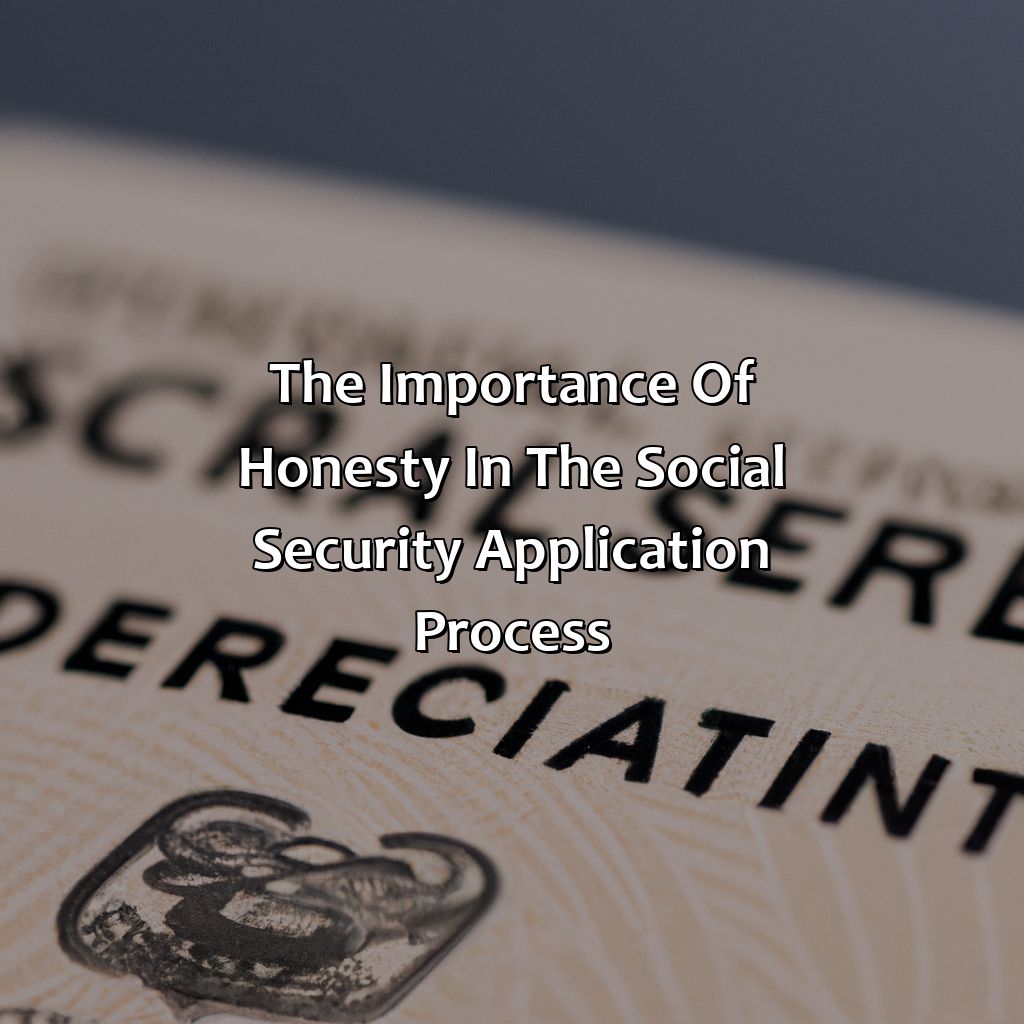What Happens If You Lie To Social Security?
Key Takeaway:
- Lying to the Social Security Administration can lead to severe penalties, including fines, imprisonment, and suspension of benefits. It is important to provide truthful information on your application and report any changes in your circumstances promptly.
- Submitting false information to the Social Security Administration is a federal offense and can result in criminal charges. It is essential to be honest and accurate in your dealings with the agency, as intentional misrepresentation can have serious legal consequences.
- Fraudulent claims for Social Security benefits can result in both civil and criminal penalties. The penalties may include restitution, fines, and jail time, depending on the severity of the offense. It is crucial to understand the legal consequences of making false claims and avoid fraudulent activities.
Have you ever wondered what the consequences are of lying to the Social Security Administration (SSA)? You’re not alone. If you’ve ever considered misrepresenting your information when dealing with the SSA, this article will give you a clear understanding of the repercussions. You may not like what you learn.
Penalties for Lying to the Social Security Administration
Lying to The Social Security Administration (SSA) comes with serious consequences. If one is caught, they may face financial penalties, imprisonment, or disqualification from future benefits. It is essential to provide accurate and truthful information to the SSA when applying for benefits or changing one’s status. Exaggerating the extent of an injury, disability, or work ability can be seen as fraudulent.
Submitting false information to obtain or continue receiving Social Security benefits can result in prosecution. Criminal charges, fines, and imprisonment are among the penalties that may be applied, depending on the severity of the offense. These penalties aim to discourage individuals from defrauding the system and taking advantage of those who genuinely need assistance.
It is important to understand that the consequences of lying to the SSA do not end with financial repercussions. One’s reputation and credibility can also be at stake, making it challenging to obtain future benefits or secure employment opportunities. Additionally, lying to the SSA can lead to deportation if one is not a United States citizen.
In a recent case, a woman was sentenced to two years in prison for submitting fraudulent medical documentation to the SSA. She claimed to be unable to work due to a severe back injury and collected over $53,000 in disability benefits. However, investigation showed that she was working full-time at a retail store and had been for several years. Such stories are examples of how severe the consequences of lying to the SSA can be.
In summary, honesty is always the best policy when dealing with the SSA. Attempting to deceive the agency can lead to significant financial and legal troubles, tarnish one’s reputation, and make it harder to obtain benefits in the future. It is essential to provide truthful information at all times.

Image credits: retiregenz.com by Joel Washington
Charges and Punishments for Submitting False Information
Submitting False Information to Social Security Administration (SSA)
Providing false information to the SSA could result in severe legal and financial consequences. Fraudulently applying for disability benefits or misreporting earnings may lead to criminal charges, fines, or imprisonment.
Possible Fallout from Submitting False Information
Submitting incorrect information to the SSA could result in the suspension or denial of benefits, as well as the need to pay back any overpayments. In some situations, SSA may report the fraudulent activities to other law enforcement agencies, resulting in serious legal repercussions.
Understanding the Impact of Submitting False Information
Providing incorrect data to SSA not only endangers personal finances but also harms the entire integrity and efficiency of the Social Security system. Ultimately, false reporting only hurts honest social security recipients by increasing the workload and potentially reducing the amount of distributed funds.
Source
According to a report by the Government Accountability Office, the Social Security Administration made $7.8 billion in improper payments in 2019.

Image credits: retiregenz.com by Joel Duncun
Legal Consequences of Fraudulent Claims
A false statement in a Social Security claim can result in severe legal consequences. The Social Security Administration takes fraud and abuse of their programs very seriously. Failing to report any income, assets or change in marital status could lead to legal penalties, fines or even imprisonment. Such fraudulent activities can result in a lien on future social security payments, wage garnishments, restitution orders or even forfeiture of benefits. These consequences may vary based on the type of fraud committed and the severity of the offense.
It is important to remember that fraudulent activities can have long-term consequences and can impact not only an individual’s benefits but also their reputation and future job prospects. Additionally, other agencies can be involved in investigating such activities, including the Department of Justice and the Federal Bureau of Investigation.
Some scammers also try to obtain an individual’s Social Security number and use it for identity theft purposes. This is a very serious crime and can result in legal consequences as well as financial loss to the victim. It is essential to report any suspicious activity involving social security numbers or social security benefits to the authorities immediately.
According to a recent report by the Office of Inspector General, the Social Security Administration prevented more than $6.4 billion in improper payments in the fiscal year 2020. The agency also successfully disciplined more than 1,000 individuals for fraud and abuse of their programs. It shows that the Social Security Administration is vigilant in detecting and preventing fraudulent activities within their programs and is committed to maintaining the integrity of the system.

Image credits: retiregenz.com by Yuval Duncun
Social Security Overpayments and Debt Collection
Overpayments received from Social Security can lead to debt collection. The consequences of lying to Social Security regarding these overpayments can include fines, a prison sentence, and restrictions on receiving benefits. It is important to promptly address overpayments and contact Social Security if confused about the amount owed. Failure to do so can result in an increased amount of debt, making it difficult to repay. Make sure to stay informed about overpayments, as Social Security can take action such as garnishing wages or withholding tax refunds if necessary.

Image credits: retiregenz.com by Harry Arnold
The Importance of Honesty in the Social Security Application Process
The significance of truthfulness during the social security application process cannot be understated. Honesty is crucial to ensure that individuals receive the benefits they deserve without any complications or legal repercussions. It is imperative to provide accurate information about your income, medical history, and other relevant data.
Inaccurate disclosure of information while applying for social security can have severe consequences. It can result in the denial of benefits, legal penalties or fines, and even criminal charges. Applicants have to provide truthful, complete, and accurate information about themselves, their work history, earnings, and medical conditions.
Moreover, it is essential to note that social security fraud is a criminal offense, and it can result in imprisonment, a criminal record, and hefty fines. Therefore, applicants must ensure that the information they provide is accurate and truthful, to avoid legal repercussions.
Pro Tip: Always be honest and provide accurate information while applying for social security benefits. It can save you from legal penalties and help you receive the benefits you deserve.

Image credits: retiregenz.com by Yuval Woodhock
##Example Response:
Some Facts About What Happens If You Lie to Social Security:
Lying to Social Security can result in criminal charges. (Source: Legal Beagle)
The penalties for lying to Social Security can include fines, imprisonment, or both. (Source: Investopedia)
Social Security benefits can be denied or suspended if someone lies about their eligibility. (Source: AARP)
It is important to report any changes or inaccuracies in your information to Social Security to avoid potential penalties. (Source: Social Security Administration)
If you suspect someone of lying to Social Security, you can report it to the Office of the Inspector General. (Source: Social Security Administration)
FAQs about What Happens If You Lie To Social Security?
What happens if you lie to social security?
If you are found to have lied or provided false information to the Social Security Administration (SSA), you may face serious consequences, including criminal charges and financial penalties.
What types of lies can get you in trouble with social security?
Lies that may trigger penalties include false financial information, inaccurate work history, and misrepresenting your identity or disability status to obtain benefits.
What are the possible penalties for lying to social security?
You may be charged with fraud, fined, have to repay any benefits obtained under false pretenses, and even face imprisonment.
How does Social Security Administration investigate potential fraud or lies?
The SSA has an Office of the Inspector General that investigates fraud leads and handles administrative sanctions and prosecutions if laws are violated. They may also employ investigators from other government agencies to help in certain cases.
What should you do if you think you made a mistake on a Social Security application?
You should report the error or mistake to the SSA immediately to avoid any potential fraud or misrepresentation charges. Correcting the mistake may result in a reduction or termination of benefits, but it is better to resolve the situation than to face more serious penalties.
Are there any exceptions for lying to Social Security?
No, there are no exceptions. Lying to Social Security is illegal, and everyone who does so can face serious consequences, regardless of the reason or justification.
 Checkout this IRS Loophole
Checkout this IRS Loophole 
